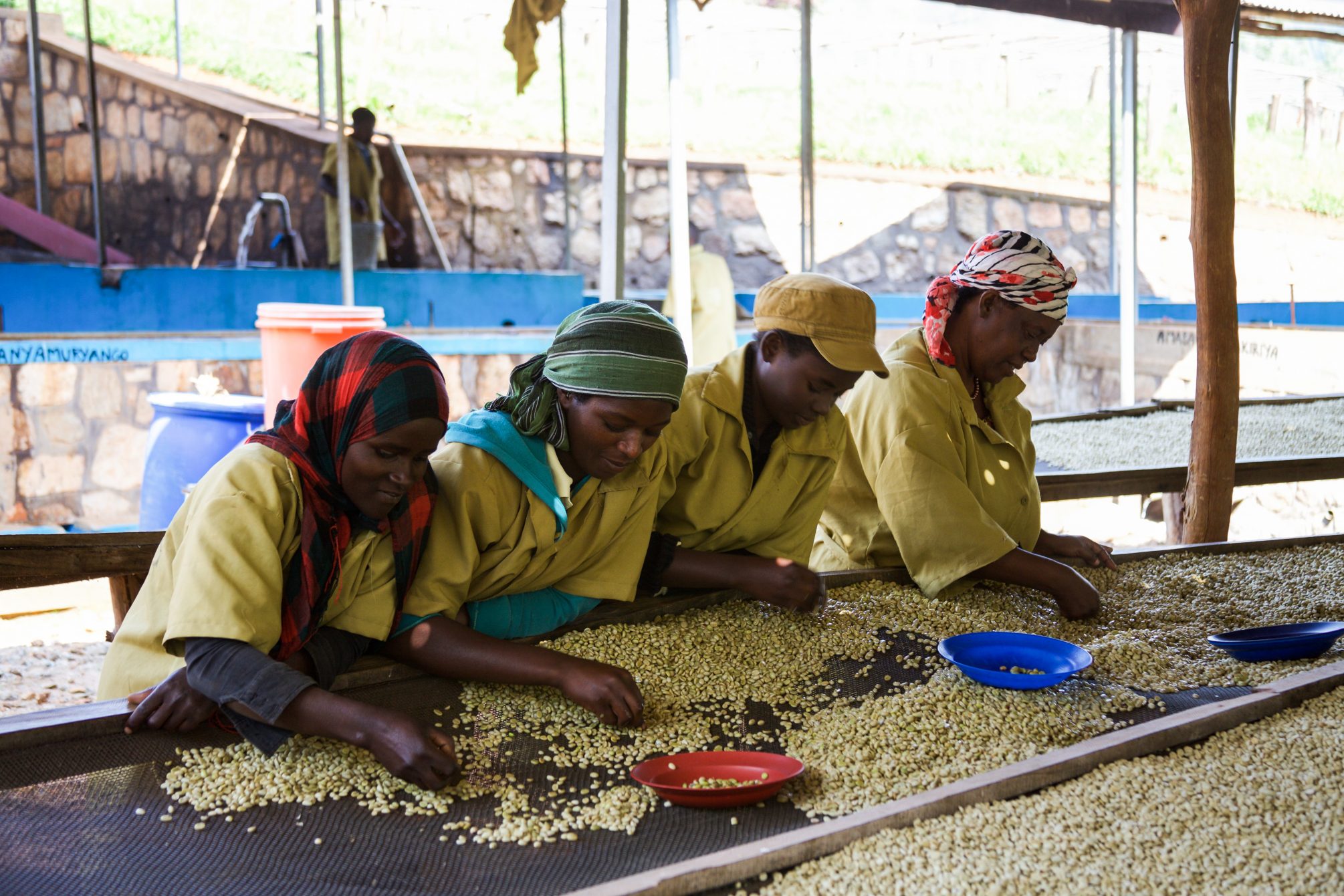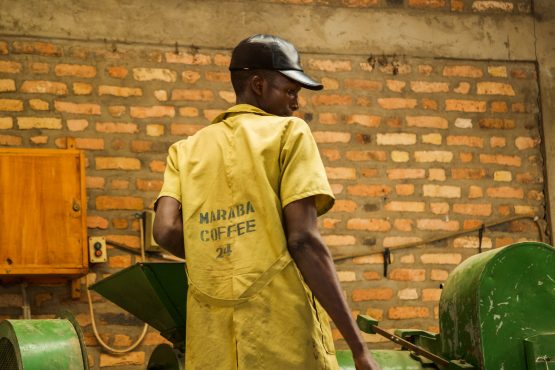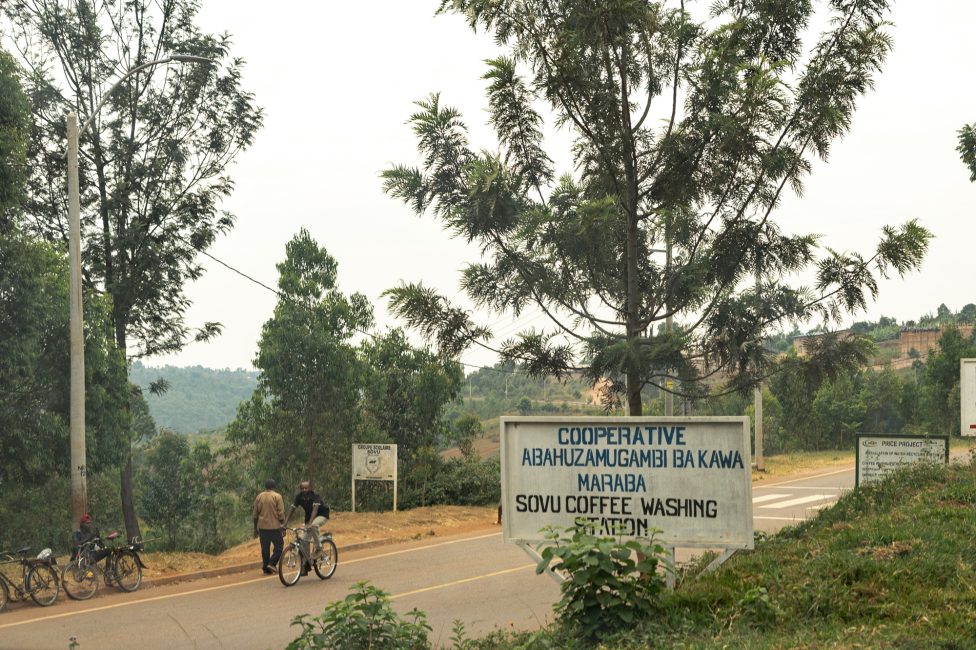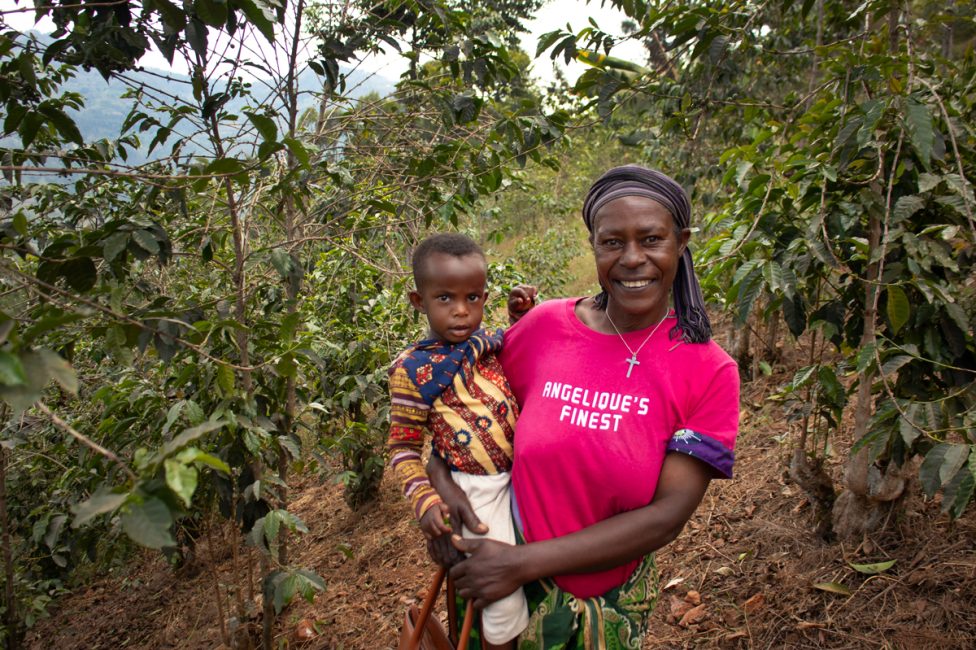Maraba Kabuye
Syrupy and sweet, with raspberry acidity and notes of dark chocolate, candied orange peel, red apple, and vanilla. Well structured and balanced.
Kabuye is among the four coffee washing stations owned by the Abahuzamugambi Ba Kawa Maraba Cooperative, which also include Kibingo, Maraba Sovu, and Cyarumbu.
In the local language (Kinyarwanda), Abahuzamugambi Ba Kawa means ‘Together we work the coffee’. This name is very fitting: this cooperative, established in 2001, was one of the first coffee cooperatives (if not the very first) to arise in the wake of the devastating 1994 genocide, and it has since become a refreshing symbol of hope and progress in the community and coffee sector. The cooperative and its washing stations were set up as model operations to showcase how to go about setting up and processing coffee to maximise quality potential. Many leaders in the specialty coffee industry in Rwanda started their career at Maraba, including Epiphanie of Buf Cafe.
All of the members of the cooperative are very small-scale producers who typically own less than a quarter of a hectare of land, on which they cultivate an average of only 100–300 coffee trees, each along with other subsistence food crops such as maize and beans.
By selling their coffee to Abahuzamugambi Ba Kawa Maraba, these small-scale farmers are able to combine their harvests into large enough quantities for export and process cherries centrally. Abahuzamugambi Ba Kawa Maraba was the first cooperative to build a washing station in Rwanda, and as such it has been set up as a model operation, with every stage of production considered and established in the best possible way.
Before the proliferation of washing stations and cooperatives in Rwanda such as Abahuzamugambi Ba Kawa Maraba, the norm in Rwanda was for small farmers to sell semi-processed cherries on to a middleman—with the market dominated by a single exporter. This commodity-focused system—coupled with declining world prices in the 1990s—brought severe hardship to farmers, some of whom abandoned coffee entirely. Today, it’s a different picture. Farmers who work with Abahuzamugambi Ba Kawa Maraba have seen their income at least double, and the cooperative produces outstanding lots for us year after year.
As it has evolved over the years, the cooperative has grown to encompass various communities of coffee growers in the Huye district. The cooperative provides these members with agricultural training and support around quality and productivity to help them to continue to improve their output. In addition, they have established various social programs, including health care, school fees, and medical insurance that greatly contribute to the livelihoods of their members.
The Kabuye Coffee Washing Station is the second washing station to be established by the Abahuzamugambi Ba Kawa Maraba cooperative and has over 1,200 members. Production and Quality Control is overseen by Maraba manager Biziyaremye Theophile, who has extensive experience and knowledge when it comes to quality coffee production. The cooperative has recently finished construction of a warehouse so coffee can be safely stored onsite, a new water treatment facility has been put into place, and the mechanical cherry sorter upgraded to help further improve cherry sorting and quality control.
The cooperative has consistently been recognized for quality including numerous Cup of Excellence awards in 2008, 2011, 2012, 2013, and 2015. This is no small accomplishment, and this year’s offering is right up with these exceptional lots.
HOW COFFEE AT KABUYE WASHING STATION IS PROCESSED
The team at Kabuye Washing Station take a huge amount of care in sorting and processing their coffee. They own their own dry mill which enables them to control quality all the way through to export.
- Cherries are delivered to the washing station on the same day as they are picked, and are inspected and sorted to ensure only the very ripest cherries are processed. They are then put into a floatation tank and sorted by weight (and any floaters removed), and pulped on the same day—almost always in the evening—using a mechanical pulper that divides the beans by weight (the heaviest usually being the best).
- After pulping, the coffee is fermented overnight for around 12–18 hours and then graded again using floatation channels that sort the coffee by weight. The beans are then soaked for a further 24 hours before being moved to raised screens for ‘wet-sorting’ by hand. All water used during the processing comes from a natural spring with water from the mountains.
- As with most washing stations in Rwanda, women do the majority of hand sorting. This takes place in two stages—on the covered pre-drying tables and on the drying tables. Washed beans are moved from the wet fermentation tanks onto the pre-drying tables, where they are intensively sorted under shade for around six hours. The idea is that green (un-ripe) beans are still visible when they are damp, while the roofs over the tables protect the beans from the direct sunlight.
- Next, the beans are moved onto the washing station’s extensive raised drying tables (‘African Beds’) for around two weeks, where they are sorted again for defects, turned regularly and protected from rain and the midday sun by covers, ensuring both even drying and the removal of any damaged or defective beans. During this period, the coffee is also turned several times a day by hand to ensure the coffee dries evenly and consistently.
- After reaching 11% humidity, the coffee is stored in parchment and then, when adequately rested, it is carefully dry milled at the cooperative’s brand new dry mill.



